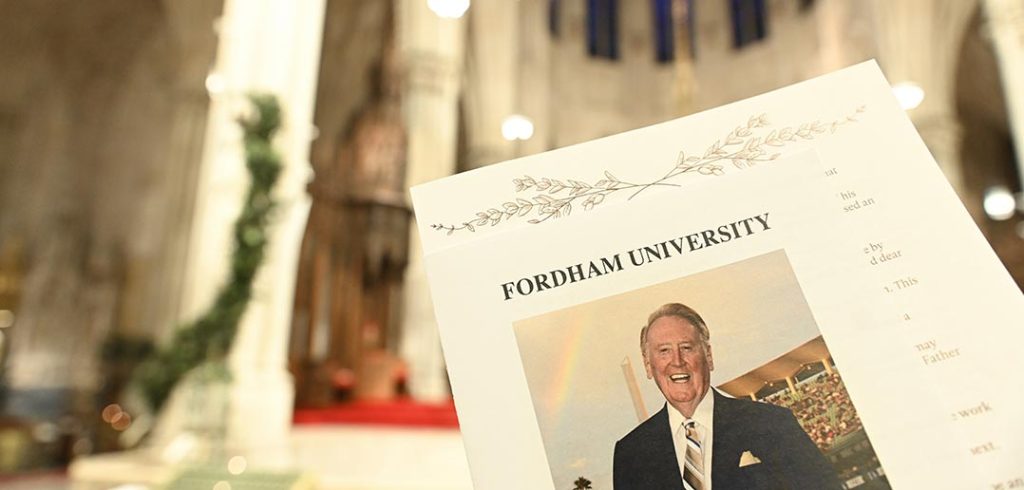As they headed down the Grand Concourse, Yankees star Reggie Jackson came to bat with his team losing 9-2 and down to its last out. “We heard from the radio the Bronx faithful chanting, ‘Reggie … Reggie … Reggie,’” Father Parkes remembered.
“The next words we heard were Vin’s: ‘It sounds like the chorus of a Greek tragedy.’
“Billy said, ‘What would Scully know about Greek tragedy?’
“I said, ‘Billy, he graduated from Fordham Prep and Fordham University.’
“That took care of Billy. ‘I get it now,’ he said.”
The vivid memory was part of Father Parkes’ homily at St. Patrick’s Cathedral Wednesday morning, March 22, during a Mass in memory of the 67-year voice of the Dodgers, from Flatbush to Chavez Ravine, who was described as “your servant Vincent Edward.” For all those decades, from 1950—less than a year after graduation from Fordham, where he was one of the original voices of WFUV, the university’s radio station—until Scully’s retirement in 2016, those two roles, voice and servant, had been intertwined. While describing a baseball game, he would somehow find a way to weave in relevant references to poems or poets, philosophical observations, and reverential hints at his faith that were as understated as they were unmistakable.
Like when he reported that a player dealing with a minor injury was described by the team as day-to-day, and he added: “Aren’t we all?”
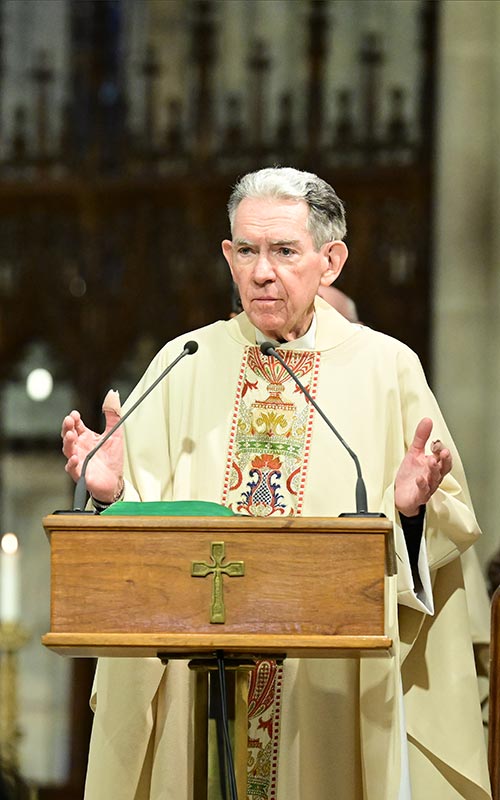
If ever there was a Fordham graduate to represent the achievement of eloquentia perfecta—perfect eloquence—Vin Scully, Class of 1949, is it. “He didn’t broadcast a game,” Los Angeles Times columnist Jim Murray once wrote. “He narrated it.”
But much of what was shared formally and informally at St. Patrick’s, more than seven months after his passing last August 2 at 94, had less to do with Scully’s technical brilliance as a storyteller than the depth of his faith and the kindness he showed to so many others.
For generations of Rams, especially those of us trying to feel connected to him in the 1970s, when the old WFUV studios were on the third floor of Keating Hall, worshipping his ability was easy, but relating to his success was hard. When the Dodgers left Brooklyn after the 1957 season, his storytelling was directed at an audience a continent away. The crowds he educated in Southern California, initially seated far from the action in the awkward configuration of a Los Angeles Memorial Coliseum built for football and track and field, were able to connect with him and the game through their transistor radios—“what bound us together,” Scully once remembered.
His work was highly regarded on a national level, and he was so much older than us. A quarter century older. We did have one connection: a control room that looked—and worked—much as it did decades earlier, but that was all. It was much easier to view him as the Voice of the Dodgers than the recent Fordham graduate standing on the roof of Fenway Park on November 12, 1949, prepared for a broadcast on the CBS Radio Network but not for the cold and wind, describing a Boston University–Maryland football game in a way that impressed Red Barber and opened the door of a lifetime.
It was just so hard to relate.
Until you met him.
Not the way you had met him at the age of 10, when he signed the cover of a scorecard outside Shea Stadium. Not when an initial visit to Dodger Stadium created the sudden requirement of finding an electronics store to purchase a radio to bring to the game, because you just had to. When the first real meeting finally took place, in July 1979, Scully didn’t have to extend his signature invitation to “pull up a chair,” because as the Dodgers took batting practice, there was plenty of room near him in the home team dugout.
So you dried your right palm against your hip as you recited the hesitant introduction you had rehearsed, saying you had graduated from Fordham and you were there to do a feature for The New York Times, and …
“New York Times?” he said. “I wrote for The New York Times.”
And that is how you learned about the brilliance you hadn’t known, how Vin Scully consistently made others comfortable by finding a connection. Scully explained that he became a campus correspondent, filing brief items from different Fordham events. As he shared his story hours before the first pitch, with the stands still empty and quiet as baseballs rocketed out of the batting cage nearby, his remarkable use of the language suddenly made sense. The words had been expressed through his fingers before they would come from his throat.
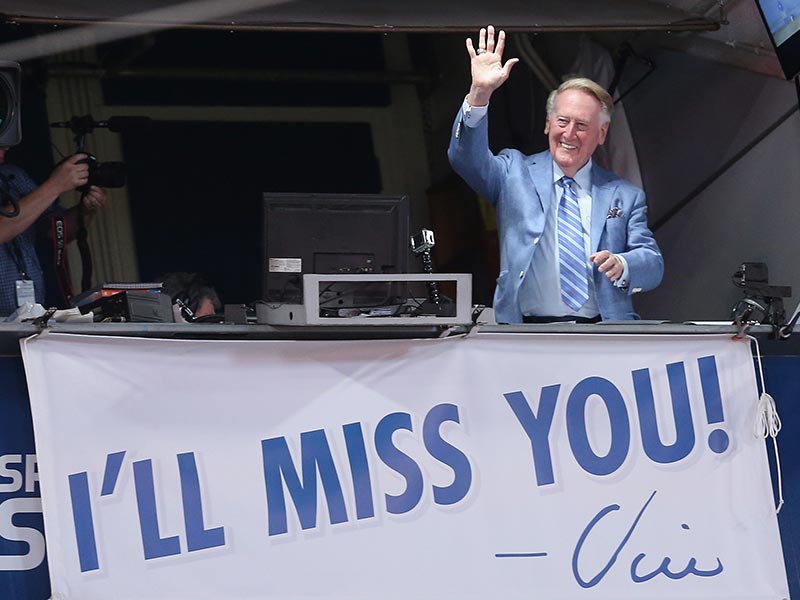
An anthology of great baseball reporting, filled almost exclusively with old newspaper and magazine articles, included one transcript: the play-by-play radio description from September 9, 1965, the night Sandy Koufax took a perfect game against the Cubs to the ninth inning at Dodger Stadium.
“Koufax, with a new ball, takes a hitch at his belt and walks behind the mound,” Scully said that night. “I would think that the mound at Dodger Stadium right now is the loneliest place in the world.”
The words read as if he had rolled a piece of paper into a typewriter and agonized over each one. The perfection that night had happened downstairs and upstairs. His appreciation and understanding of the language, and his eloquentia perfecta, developed and deepened by those eight years in high school and college at Rose Hill, had endured for the rest of his life and beyond.
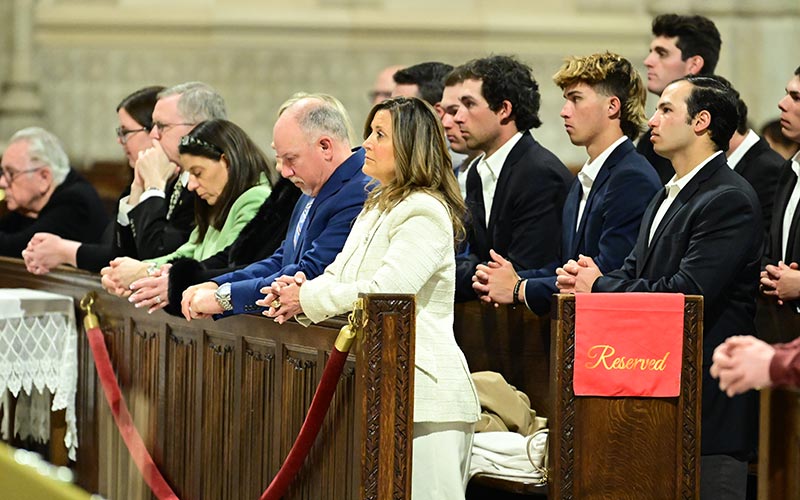
At the end of the memorial Mass, the Scully family shared a prayer, based on an 1848 meditation by St. John Henry Newman, that was described as “Dad’s North Star—his own personal mission statement.”
For 67 seasons, nine innings at a time, baseball became Vin Scully’s vehicle, and his gratitude, humility, and grace made him the link that defined the chain.
***
God has created me to do some definite service. He has committed me to some work which He has not committed to another.
I have my mission. I may never know it in this life, but I shall be told it in the next. I am a link in a chain, a bond of connections between persons.
He has not created me for nothing. I shall do good; I shall do His work. I shall be an angel of peace, a preacher of truth in my own place, while not intending it, if I do but keep His commandments.
Therefore, I will trust Him; whatever I am, I can never be thrown away.
If I am in sickness, my sickness may serve Him.
In perplexity, my perplexity may serve Him.
If I am in sorrow, my sorrow may serve Him.
He does nothing in vain. He knows what He is about. He may take away my friends. He may throw me among strangers. He may make me feel desolate, make my spirits sink, hide my future from me. Still, He knows what He is about.
—St. John Henry Newman
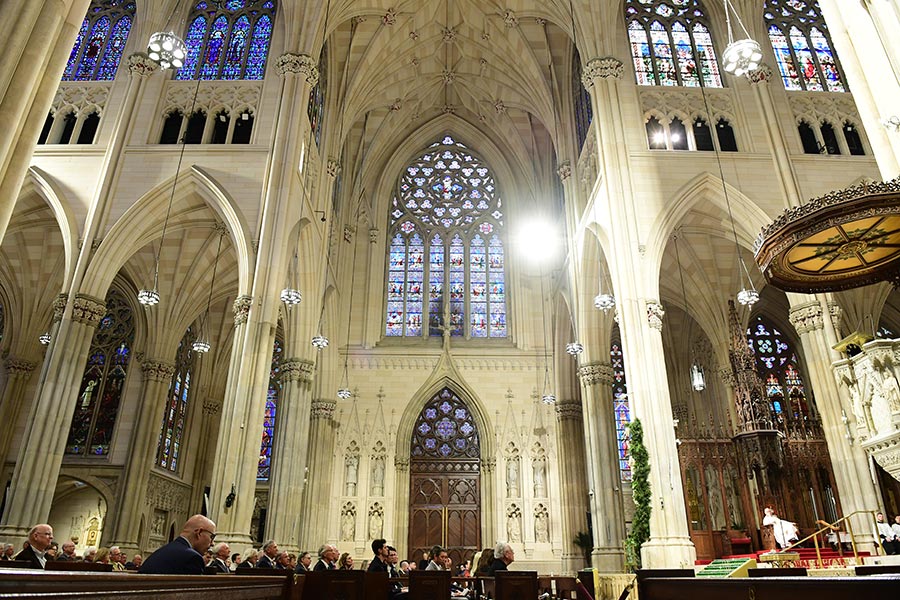
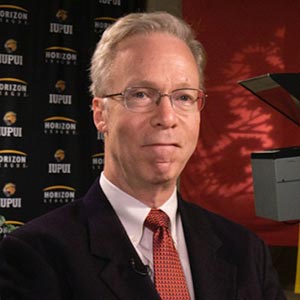 Malcolm Moran, FCRH ’75, has been the director of the Sports Capital Journalism Program and a professor of practice in journalism at IUPUI since 2013. He previously served as the inaugural Knight Chair in Sports Journalism and Society at Penn State University after a three-decade career as a reporter and columnist atThe New York Times, USA Today, and other publications. As a Fordham undergraduate, he wrote for The Fordham Ram and was the sports director at WFUV, where he started One on One, now the longest-running sports call-in show in New York. His numerous honors include a 2007 Curt Gowdy Media Award from the Naismith Memorial Basketball Hall of Fame for his coverage of basketball and the 2020 Keith Jackson Eternal Flame Award, which recognizes individuals for lasting contributions to intercollegiate athletics.
Malcolm Moran, FCRH ’75, has been the director of the Sports Capital Journalism Program and a professor of practice in journalism at IUPUI since 2013. He previously served as the inaugural Knight Chair in Sports Journalism and Society at Penn State University after a three-decade career as a reporter and columnist atThe New York Times, USA Today, and other publications. As a Fordham undergraduate, he wrote for The Fordham Ram and was the sports director at WFUV, where he started One on One, now the longest-running sports call-in show in New York. His numerous honors include a 2007 Curt Gowdy Media Award from the Naismith Memorial Basketball Hall of Fame for his coverage of basketball and the 2020 Keith Jackson Eternal Flame Award, which recognizes individuals for lasting contributions to intercollegiate athletics.

